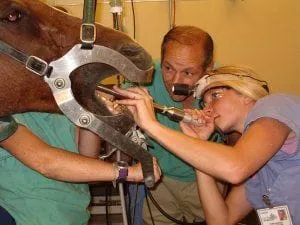
Dental care for horses differs significantly from that of humans or even cats and dogs. Due to their vegetarian diet and manner of eating, a horse’s teeth work more like a gristmill, constantly grinding and mashing down their food. The horse’s teeth are therefore designed to keep growing as an adaptation to the manner in which they eat.
Therefore, horses usually need a dental checkup every six months to have their teeth floated (evened out) in order for the horse’s bite to remain healthy, and so that their food is evenly ground for healthy swallowing and digestion. Newborn foals have their gums and tongue checked, even before the first teeth erupt, in order to evaluate and assess possible bite issues.
What You Need to Know about Horse Dental Care
As a horse owner or someone who works with horses, it is important to know what kinds of dental trouble signs to look for so that your horse is able to eat and work comfortably. As mentioned previously, your horse should receive equine dental care twice a year, but it is important for you to be aware that dental problems can happen in between those checkups so you can call for assistance if necessary.
If your horse seems to be reluctant to eat, or show any signs of pain while eating, this may be a sign that his or her teeth have developed sharp points or hooks that are poking the roof of the mouth or insides of the cheeks. The occlusal (grinding) surfaces that do the grinding will usually be worn down normally, but most horses do not have completely even grinding/bite patterns, so these hooks and points can develop and need to be filed down (floated) regularly.
If your horse seems to drop a lot of food while eating, the molars may not be meeting up properly, allowing food to escape. If your horse chokes or gags on food, this can also be a sign that the teeth are not grinding the food down enough and that there is a problem that requires horse dentistry. A combination of bad breath and difficulty eating can signal that your horse may be suffering from horse periodontal disease and/or tooth decay.
During a horse dental checkup, your veterinarian may need to sedate your horse in order to perform the exam and floating. At the very least, a quiet dark place is needed to limit distractions and keep the horse calm so the vet can work. A speculum will be used to keep the horse’s mouth open so that your veterinarian can rinse out and examine each tooth, the gums, tongue and all of the mouth’s tissues for inflammation, odors, lesions, etc.
Dental health is very important for good horse health and wellness. Be sure to have your veterinarian check your horse’s teeth twice a year, and do not hesitate to call if any problems arise between scheduled appointments.
